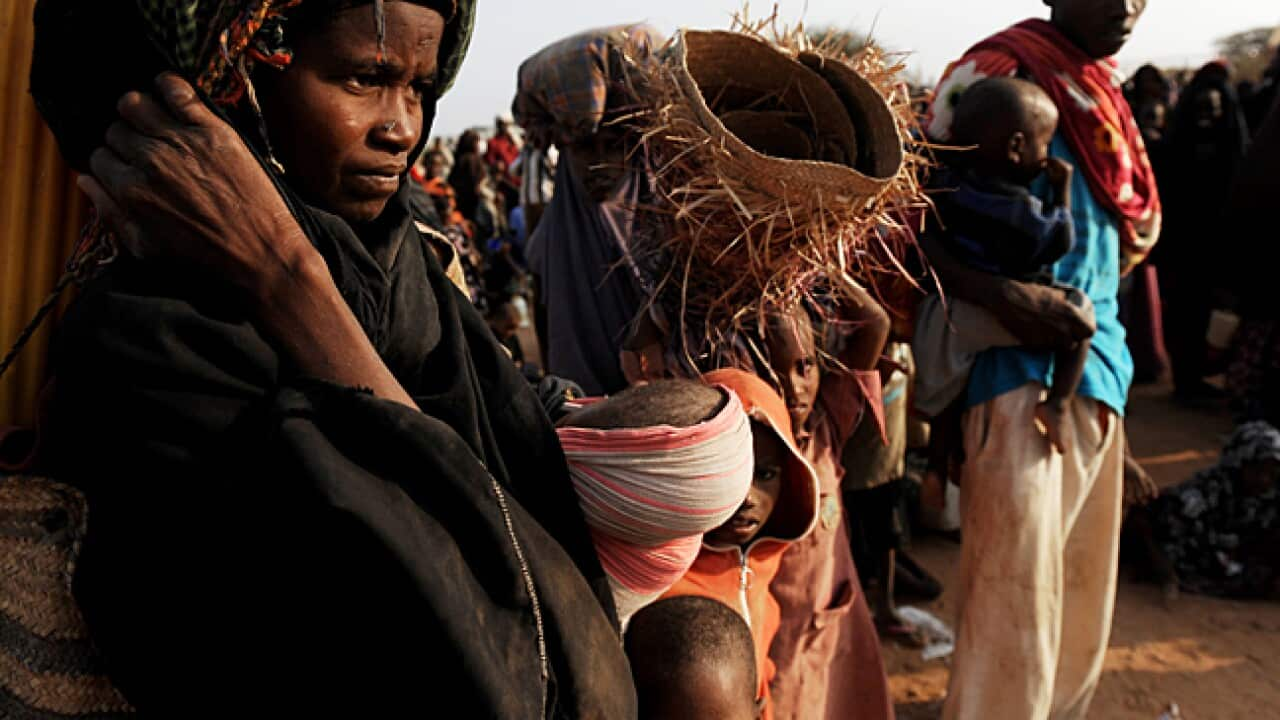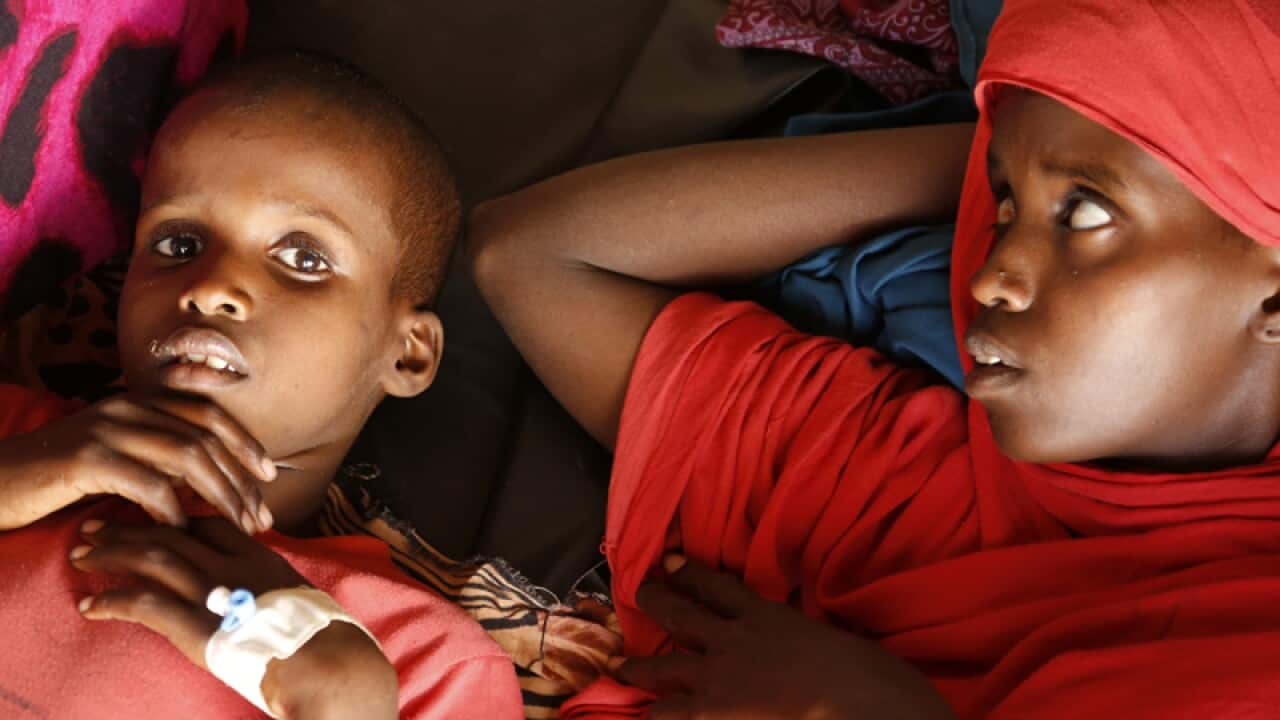Amongst the rugged terrain of the Somaliland desert, in the Horn of Africa hundreds of pastoralist families pack into the small village of Wacays Dhukur, west of the capital Hargeisa.
The Omar family moved to the area five months ago. Drought has forced them to uproot 20 times in the past two years.
They started out with 300 goats, now they have just 50. Just two metres from their tent made of old clothes, carcasses litter the ground.
Father, Omar Abi Abdi, says his family has never suffered like this before.
"I’ve never seen a drought like this in my life," he said. "We moved around with the animals but when we came here they all died.”
Mother, Canab Muse Adan, struggles to feed six children. They share a couple of handfuls of dry rice between them all each day.
She says her three-year-old son is currently fighting for his life in hospital and her two-year-old daughter passed away late last year.
"She had diarrhoea and died within three days,” Ms Adan said.
Luckily, the Red Cross mobile health clinic is in the area because overnight Canab’s youngest son, Abdi Omar Abi, fell sick.
He is screened by doctors for malnutrition. Australian Red Cross Response Manager, Jess Lees, says the clinics are saving lives in rural areas across Somaliland, by travelling to places where there’s no medical facilities available.
Australian Red Cross Response Manager, Jess Lees, says the clinics are saving lives in rural areas across Somaliland, by travelling to places where there’s no medical facilities available.

Red Cross mobile health clinics travel to areas in Somaliland where there are no medical facilities available. Source: Kirsty Johansen/SBS News
"Millions of people face the risk of famine. Australian Red Cross is supporting these mobile health units and are aiming to see them double over the next few months," Ms Lees said.
At the mobile clinics, children’s height and weight are recorded and they are given basic medication if needed. Head Medical Practitioner, Doctor Saleean Ibrarhim, says the clinic’s main priority is to treat the most vulnerable - children and women.
Head Medical Practitioner, Doctor Saleean Ibrarhim, says the clinic’s main priority is to treat the most vulnerable - children and women.

There are only 16 beds in the stabilisation centre, but five children are allowed to stay on mattresses on the floor. Source: Kirsty Johansen/SBS News
"We do all kinds of different vaccinations like polio, measles and also tetanus," Dr Ibrarhim said.
If necessary, doctors can refer patients to the closest hospital. But medical facilities across Somaliland are at breaking point.
We visited the biggest acute malnutrition clinic, situated in the capital Hargeisa, where the situation is so desperate.
There are only 16 beds in the stabilisation centre, but five children are allowed to stay on mattresses on the floor.
Saynab Maxamed Ismaciil, aged 10 months, has been suffering from vomiting and diarrhoea for the past four months. She has lived off only milk since the day she was born.
It’s a race against the clock for doctors.
She’s monitored closely, weighing in at just a mere 5kg.
Her mother, Faadumo Ismail Dirie, says she’s worried she will die.
"At the beginning she got sick. She had vomiting and diarrhoea and now she’s anaemic. It depends on God. She might live or die,” Ms Dirie said.
Mothers travelled for days to reach this clinic, leaving behind dozens of other children. Faadumo Ismail Hussein arrived here with her daughter, Abdirashiid Mohamud Ahmed, just in time.
Faadumo Ismail Hussein arrived here with her daughter, Abdirashiid Mohamud Ahmed, just in time.

Somaliland has been in drought for three years. Source: Kirsty Johansen/SBS News
The eight-month-old’s been suffering from malnutrition for the past two months, with no food available at all in her home village.
She picked up pneumonia in the past week and almost didn’t make it.
"The first day I took her to the hospital she was about to die but now she’s feeling better and recovering," Ms Hussein said.
Children are dying every week because there’s not enough space to treat everyone.
General Practitioner, Ahadar Omar, says the hospital’s capacity hasn’t increased since it was built in 1953 and only eight to 10 new patients can be admitted each day.
"If the situation continues like this an emergency situation may happen in the near future," he said.
"Most of them will cope; we start management immediately and most of them improve and go back to their village. But some of them die because their health situation is very critical.”
There are several doctors and nurses on hand, but there are no qualified paediatricians in the whole of Somaliland.
Somaliland Member of Parliament and a dual Australian citizen, Ibrahim Ahmed Reigal, says they desperately need help.
"Only god knows what will happen but as a human being it’s a worrying situation," he said.
"I appeal to my fellow Australian people to join the effort and the people of Somaliland from this severe drought.”
The drought that appears to be worsening has lasted for three years and left more than 6.2 million people without enough food, if any at all.
Somalia is at risk of its third famine in 25 years and it could be declared as early as June if decent rain doesn’t fall.
It’s the wet season, but the land remains desolate brown. We saw it rain in some of the villages we visited but it only lasted for a couple of minutes. Small amounts of rain just making the situation worse, spreading disease even more.
We saw it rain in some of the villages we visited but it only lasted for a couple of minutes. Small amounts of rain just making the situation worse, spreading disease even more.

SBS reporter Kirsty Johansen in Somaliland. Source: SBS News
Any drop of water people can find is highly contaminated.
A local businessman helped those suffering by filling a nearby well.
Pastoralist, Faadumo Ali, says she walked for hours to fill her jerry cans.
"We haven’t had water for the last three months," Ms Ali said. "When I give the animals and the family this water it will run out immediately."
Kirsty Johansen travelled to Somaliland with the Australian Red Cross as part of their .











